25-Year-Old Man Complains About His Mom Making Him Take Care Of A Dog While He Lives Rent-Free In Her House
Unreasonable real estate prices are driving more and more young adults to stay home with their parents. It doesn't matter if you work one, two, or three jobs—rent prices are becoming so unaffordable that it borders on ridiculous.
Of course, expectations will differ from family to family, but the general understanding when moving back in with your parents is quite simple. They can ask you to pay rent, cover half of your utilities and groceries, and contribute to the upkeep of the home.
Between being homeless and fulfilling those responsibilities, it's not really a difficult choice. A 25-year-old OP currently lives with his parents, and for the most part, they get along well enough.
However, there is one subject where OP refuses to budge: the dog. OP's mom has been wanting to adopt a dog, but OP has stated that he won't help out at all.
OP insists that he will not walk, feed, or take care of the dog under any circumstances. After work, OP goes through the back door to avoid the dog, which stays in the front part of the house as part of its training.
OP says that if he enters through the front door, the dog will beg him to go outside. OP's mom arrives home from work around 6 PM, but by then, the dog has already done its business inside the house since OP refuses to take it outside.
OP's Mom Called Him an A**hole for Not Letting the Dog Out

She Said That Since OP Lives in Her House Rent-Free, the Least He Could Do Was Take the Dog Outside
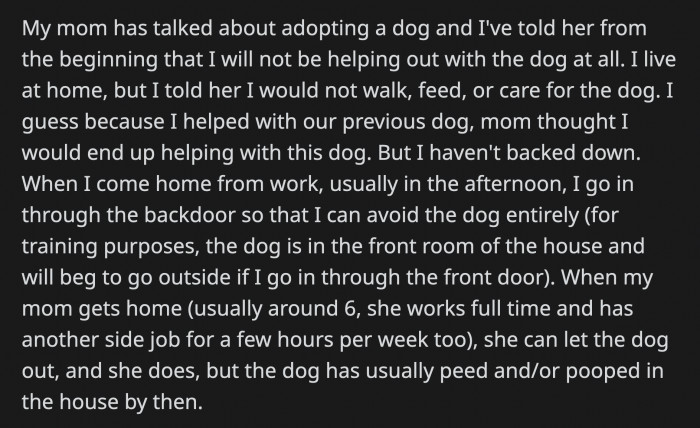
OP Thinks His Mom Is Unreasonable Since He Stated from the Beginning That He Won't Help Out with the Dog, and After All, He Is Helping Enough by Taking the Trash Out Twice a Week as a 25-Year-Old Adult
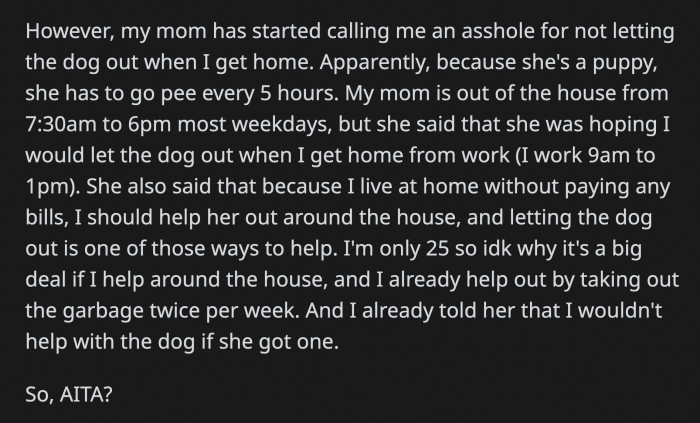
The Impact of Extended Adolescence
In today's economy, many young adults find themselves living with their parents longer, a phenomenon termed 'extended adolescence.' Research from the American Psychological Association indicates that this can lead to increased stress and anxiety, particularly when expectations clash between generations.
When parents impose additional responsibilities, such as pet care, it can exacerbate feelings of resentment. A study by Dr. Jeffrey Arnett highlights that clarifying roles and expectations is crucial for reducing conflict and enhancing familial relationships.
Psychological Resilience Through Negotiation
When navigating family responsibilities, negotiation can serve as a valuable tool for fostering resilience. Research indicates that negotiating terms can enhance problem-solving skills and emotional intelligence.
Dr. Carol Dweck’s work on growth mindset suggests that viewing challenges as opportunities for growth can empower young adults. By practicing negotiation with their parents, they can build confidence and learn to advocate for their needs, leading to healthier family interactions and increased personal agency.
Understanding Family Dynamics and Responsibilities
The dynamics of living in a family often come with shared responsibilities, which can lead to tension when expectations are misaligned.
In this case, the 25-year-old’s reluctance to take on pet care responsibilities may reflect broader issues of independence and accountability.
Research in family psychology suggests that adult children living at home can struggle with transitioning into adulthood, often leading to conflicts over household duties.
Dr. Jennifer F. H. Smith emphasizes that clear communication about responsibilities is vital for maintaining harmony in family dynamics.
In Case It Helps You Decide If OP Is Really an A**hole Like His Mom Says, OP Claims He Sometimes Does His Own Laundry and Empties the Dishwasher, and None of His Friends Do These Things, So He Shouldn't Have To
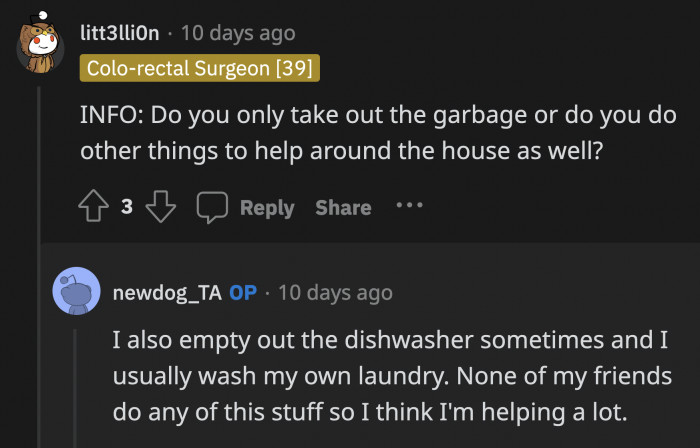
Yes, OP Only Works Four Hours a Day, and He Still Couldn't Let the Dog Out for His Mom, Who Has Two Jobs to Make Ends Meet
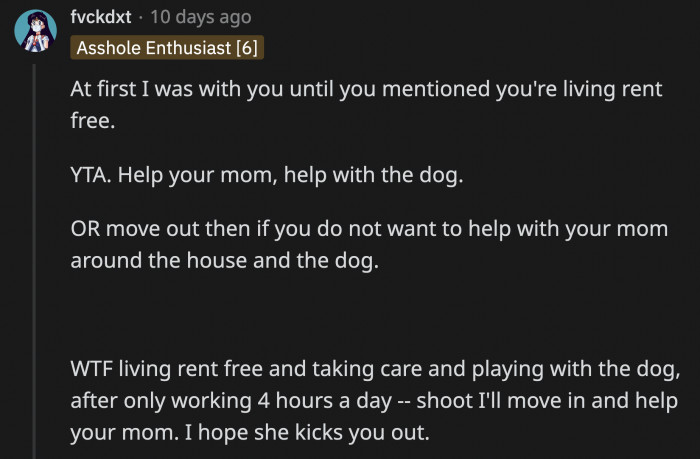
I Was Convinced a Teenager Wrote This Story Until OP Mentioned His Age, and at That Point, He Was Just Laughable
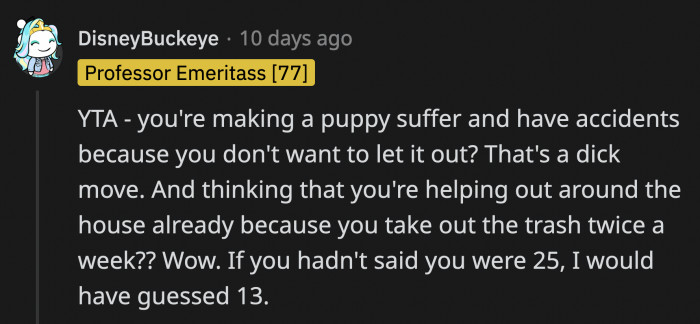
Psychological principles suggest that autonomy is vital for young adults' mental health. Research has shown that a lack of autonomy can lead to feelings of inadequacy and dependency, which can be detrimental to self-esteem.
Studies indicate that creating a structured environment that allows for personal choice can help mitigate these feelings. Encouraging young adults to negotiate responsibilities may foster a sense of ownership and empowerment, leading to a more balanced relationship and improved mental well-being.
This situation also highlights the importance of mutual respect in family relationships.
According to studies in social psychology, when family members do not feel appreciated or respected, it can lead to resentment and conflict.
Encouraging open discussions about expectations can help alleviate these tensions and promote a sense of shared responsibility.
OP Wants an Award for Doing the Bare Minimum
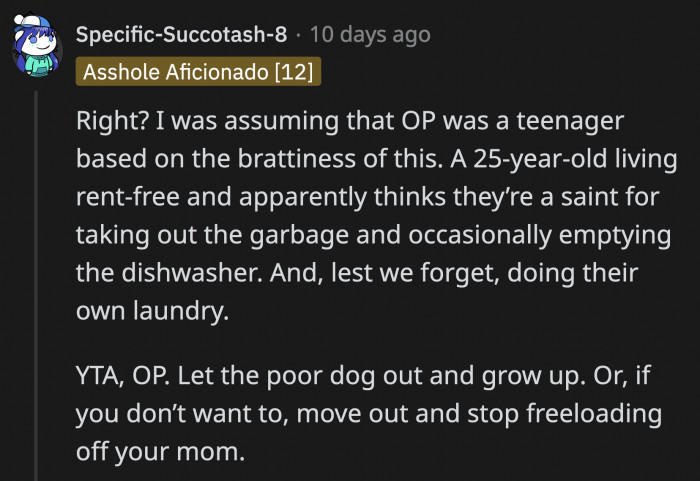
For Someone Who Is Already 25 Years Old, OP Still Has a LOT of Actual Growing Up to Do—He's Basically Coasting and Expects Everything to Fall into Place

OP Has Options Here: Continue Being a Slacker, Move Out, or Help Out with the Dog and Pay His Mom Some Rent
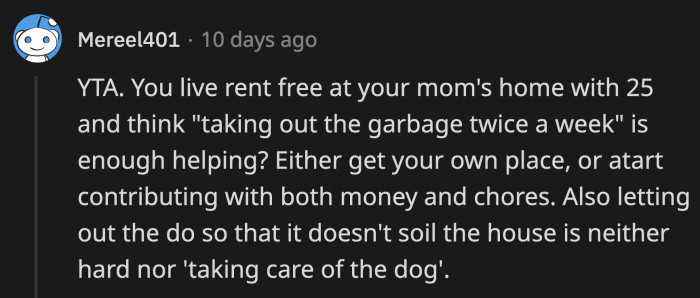
Balancing Family Dynamics
Family dynamics can often become strained when young adults feel overwhelmed by expectations. Dr. John Gottman’s research on relationships stresses the importance of open communication to prevent misunderstandings.
Encouraging family meetings to discuss household responsibilities can promote a sense of shared ownership and collaboration. This approach not only fosters healthier relationships but also aids in developing conflict-resolution skills among family members, ultimately leading to a harmonious living situation.
Fostering Independence and Responsibility
To navigate these family dynamics effectively, it’s essential to establish clear expectations around responsibilities.
Research indicates that involving adult children in discussions about household duties can foster a sense of ownership and accountability.
Implementing a collaborative approach to responsibilities can enhance family relationships and promote mutual respect.
If Everyone Acted More Maturely in This Situation, OP's Mom Wouldn't Have Adopted a Dog Knowing She Doesn't Have Enough Time for It. Given That the Dog Is Already There, OP Should at Least Let It Out When He Gets Home.

Perfectly Put. OP Is an Adult Behaving Like a Teenager, While OP's Mom Should Have Realized That She Works Too Many Hours to Really Prioritize a Dog.
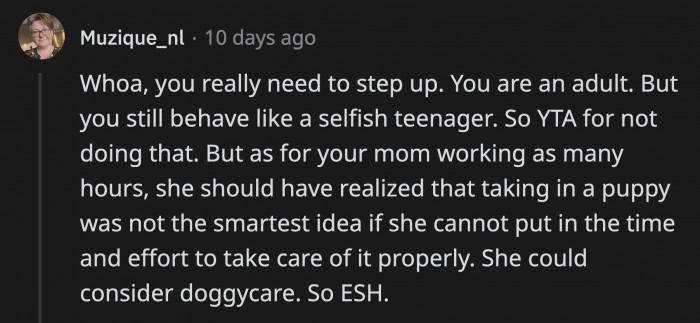
One Way to Solve Everyone's Problem Is for OP to Pay Rent So His Mom Can Use That Money Toward Hiring a Dog-Sitter, and OP Won't Have to Worry About the Dog.
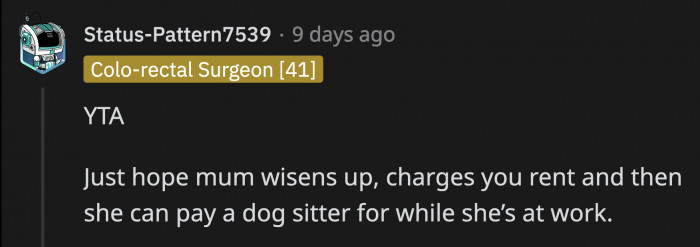
According to research published in the Journal of Family Psychology, role clarity within the family is essential for mental health. When young adults feel uncertain about their responsibilities, it can lead to frustration and anxiety.
Establishing clear agreements regarding household duties can alleviate this uncertainty. Using tools like a chore chart or a shared calendar may provide structure and reduce role ambiguity, helping young adults feel empowered and less burdened by expectations.
Someone pointed out that OP's mom was passively telling him to step up or move out when she adopted a dog she couldn't make time for. Obviously, OP didn't receive the message clearly.
He thinks his mom is being unreasonable for making him take care of a dog he didn't want in the first place. Meanwhile, OP's mom is stuck with her adult child who is determined to behave like a teenager in the foreseeable future.
Psychological Analysis
This situation reflects a common struggle in family dynamics, where differing expectations about responsibilities can lead to frustration.
Encouraging dialogue about these responsibilities can help create a more harmonious living environment.
Analysis generated by AI
Analysis & Alternative Approaches
In summary, navigating family responsibilities requires open communication and mutual respect to avoid conflicts.
According to Dr. Alexandra Solomon, a relationship expert, "Healthy family dynamics are built on understanding and cooperation. When family members communicate openly, they can address responsibilities without resentment." Addressing these issues together can strengthen family bonds and promote healthier dynamics.
Clinical Perspective & Next Steps
Understanding the psychological implications of living at home as an adult is crucial for fostering healthy family relationships. Research emphasizes that open communication, clear expectations, and negotiation can significantly reduce tensions and enhance emotional well-being.
By employing these strategies, families can navigate the complexities of shared living arrangements more effectively. As young adults learn to assert their autonomy while contributing to household responsibilities, they can cultivate a more balanced and supportive family environment that promotes mutual respect and understanding.



